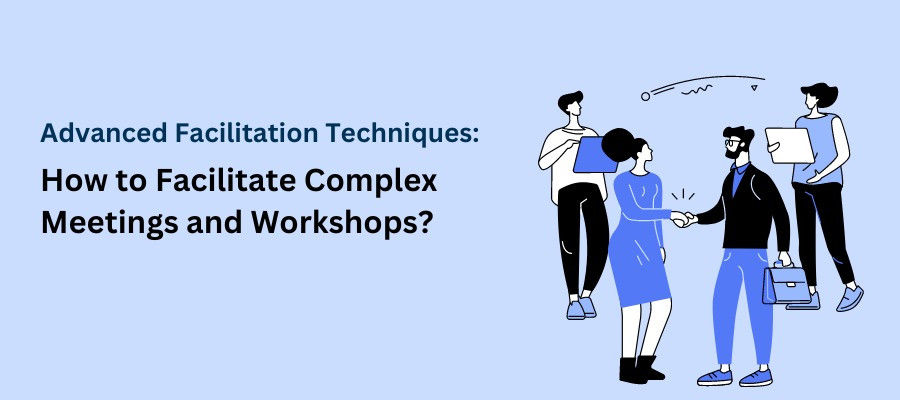Advanced Facilitation Techniques: How to Facilitate Complex Meetings and Workshops

Facilitation refers to the process of leading a team toward a shared objective. It's a talent that can be honed with consistent effort. Facilitators may help groups function more effectively and have more meaningful dialogues by studying and utilizing cutting-edge facilitation techniques. Meeting and workshop leaders can benefit from advanced facilitation approaches that help groups tackle challenging issues, define their goals more precisely, and come to an agreement more swiftly and confidently.
1. Active Listening
Techniques of active listening entail being present and engaged with the group in order to comprehend the discourse and make certain that everyone's voice is heard. Active listening strategies may be found under active listening techniques. To engage in active listening, one must focus on the speaker's words as well as their tone of voice and body language. This is helpful for the facilitator in understanding each person's perspective and identifying underlying concerns that might not be immediately obvious. Also, active listening makes participants feel heard and valued, which can raise their level of interest in the discourse that is taking place.
2. Structured Discussions
Meeting facilitators can keep sessions on topic and make sure everyone is heard when they use a structured discussion format. In order to facilitate discourse, structured talks include the use of questions, activities, and other aids. This can aid the group in delving into difficult themes, separating out points of agreement and disagreement, and ultimately coming to a decision. The time required for meetings and seminars may be cut down with the aid of structured discussions, which also help keep participants interested.
3.Learn new techniques
Staying ahead of the curve requires an open mind and a proactive approach. Take the time to explore online facilitation toolboxes, watch videos & read books to stay up-to-date with the latest tools and techniques. You'll be surprised at the innovative ways you can engage with your peers and colleagues to exchange best practices. Additionally, you'll be able to make the most of the resources available to you. Learning something new every day will help you stay current and continue to grow as a professional.
4. Get trained
Attending a general facilitation training or taking part in specific facilitation frameworks or courses is an effective way to nurture and refine your facilitation skills, regardless of whether you are a novice or a professional. These courses can provide you with the necessary knowledge, tools and techniques to excel in the field of facilitation. With the help of these courses, you can gain an insight into the fundamentals of facilitation, discover methods to create a productive and engaging environment, learn how to design and structure effective facilitation sessions and even get certified for your proficiency. So, if you want to take your facilitation abilities to the next level, there is no better way than to invest in professional training.
5.Work as a team with experienced facilitators
Gain first-hand experience in the art of facilitation by co-facilitating with experienced facilitators. This is a great way to learn the ropes of the trade and hone your skills quickly. Working together with those who already possess the expertise will provide you with new perspectives on the design of group processes. You'll observe in real-time the different strategies used to manage conversations, and learn how to apply them in the future. Co-facilitating is an invaluable learning opportunity, and one that will undoubtedly benefit your facilitation abilities.
6. Brainstorming
The process of brainstorming helps you come up with novel approaches to issues you're facing. The purpose of a brainstorming session is to generate creative ideas and possible solutions by tapping into the collective knowledge of the participants. The facilitator's job is to make sure everyone gets to speak, and that no ideas are shot down. You may use this method to brainstorm, find solutions, and reach agreement.
7. Use visual tools
Visual aids like charts, diagrams, and photographs may aid in talks and make difficult topics simpler to understand. Group ideas and the connections between them may be seen with the use of visual representations. One way to get people interested in what you have to say is to supplement your talk with visual aids so they can better absorb and debate the information being presented. The use of visual aids such as diagrams, photographs, and graphics helps speed up the consensus-building process by better representing the group's thoughts and illustrating the connections between various ideas.
Best ways to prepare a meeting
One of the most important aspects of meeting preparation is thinking of pertinent questions to ask. Meaningful stakeholder engagement necessitates familiarity with the issues at hand and the ability to foresee the needs of the many parties involved. Listening attentively and responding appropriately are other hallmarks of an effective facilitator. Part of being a good facilitator is knowing how to construct a good process. Examining the meeting's framework, stakeholder roles, and desired outcomes is part of this process. A well-defined agenda enhanced the group's ability to stay on task and concentrate. It is incumbent upon the facilitator to ascertain the reason for the gathering and structure the agenda accordingly.
At last, Preparation for meetings should also include communicating with relevant parties. A skilled moderator can encourage candid discussion within the group and ensure everyone has a chance to speak out.
These advanced facilitation techniques help facilitators create productive and meaningful meetings, seminars, and workshops. In addition, by employing these strategies, you can help your group reach its goals more efficiently and effectively.
Reference Links:
https://www.sessionlab.com/blog/facilitation-skills/#how-can-i-improve-my-facilitation-skills
https://ctb.ku.edu/en/table-of-contents/leadership/group-facilitation/facilitation-skills/main



